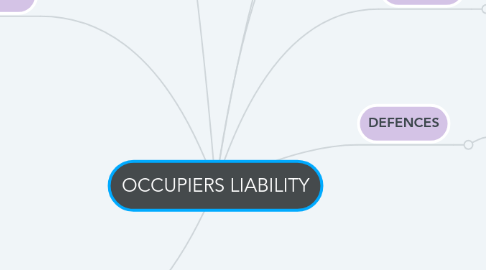
1. CONTRACTUAL ENTRANTS
1.1. A person who is on the premises pursuant to a contractual right.
1.1.1. 1. Main Purpose Entrant
1.1.1.1. Someone who enters the premise for the purpose of occupying it and has paid to be on the premise.
1.1.1.2. e.g: A tenant, guest of hotel.
1.1.1.3. The occupier's duty is to ensure the premises is safe, must employ and exercise reasonable steps.
1.1.1.4. Case: MACLENAN V SEGAR, a fire broke out at the defendant's hotel and the plaintiff was injured. The court held that the defendant is liable for failing to ensure the safety of the premises.
1.1.2. 2. Ancillary Purpose Entrant
1.1.2.1. Someone who has paid to be on the premises for primary purpose.
1.1.2.2. e.g: A passenger on a bus, a patient at private hospital.
1.1.2.3. Case: GILLMORE V LONDON COUNTY COUNCIL, the plaintiff fell during class because of the slippery floor. She successfully claimed as the failure of the defendant to ensure the floor was suitable for physical exercises.
2. INVITEES
2.1. A person who enters the premises with the consent of the occupier.
2.1.1. 1. Legally Authorised Entrants
2.1.1.1. Someone who enters the premises on the authority of the law.
2.1.1.2. e.g: Policemen, firemen.
2.1.1.3. Case: SHAMSUDDIN V YAP CHOH TEH & ANOR, the policeman is an invitee and a duty of care was owned to him. Hence, the defendant is liable.
2.1.2. 2. Business Visitors
2.1.2.1. Someone who enters the premises, public or private, for materialistic reason and bring economic advantages.
2.1.2.2. e.g: Customer at a supermarket or bank, an employee at his place of work.
2.1.2.3. Case: INDERMAUR V DAMES
2.1.3. a. Duty of invitee to invitee. b. Meaning of occupier's knowledge. c. Meaning of unusual danger. d. Knowledge of the plaintiff.
2.1.3.1. Cases: DOBB & CO LTD V HECLA HAWKINS V COULSDON & PURLEY UDC CHRISTMAS V GENERAL CLEANING CONTRACTORS
3. TRESPASSER
3.1. A person who enters premises without any express or implied permission of the occupier.
3.2. e.g: A wandering child, a thief, a person who has lost his way.
3.3. A person who is legally authorised to be on the premises may become a trespasser.
3.3.1. If he goes onto a restricted area.
3.3.2. If he stays on the premises beyond the time allowed to him.
3.3.3. If there has been an improper use of the premises.
3.4. Case: ROBERT ADDIE & SONS LTD V DUMBRECK BRITISH RAILWAYS BOARD V HERRINGTON
3.5. Child trespasser- the 'allurement' factor.
4. DEFINITION
4.1. In the case of Wheat v Lacon & Co Ltd, Lord Denning said, "Occupier is simply a convenient word to denote a person who has sufficient degree of control over premises to put him under a duty of care towards those who came lawfully on the premises."
4.2. Someone who has the immediate supervision and control and the power of permitting or prohibiting the entry of the persons.
5. PREMISES
5.1. All forms of buildings, land spaces, vehicles which are used for carrying persons.
6. LICENSEES
6.1. A person who has the occupier's expressed or implied permission to enter but does not have any community of interest.
6.1.1. 1. Entrant as of Right
6.1.1.1. Someone who has the right to enter the premises that are open to public.
6.1.1.2. e.g: public swimming pool, public park.
6.1.1.3. Actual knowledge of the occupier as to the existence of danger is not necessary and the licensee visitors cannot assume that the premises will be free from dangers. However, the occupier must take reasonable steps to avoid damage.
6.1.1.4. Case: AIKEN V KINGBOROUGH CORPORATION
6.1.2. 2. Social Visitors
6.1.2.1. Someone who enters into a private premises with permission of the occupier.
6.1.2.2. Social in nature and does not confer any materialistic or economic advantage.
6.1.2.3. Case: YEAP CHENG HOCK V KAJIMA TAISEI JOINT VENTURE, the Plaintiff visit a mine and was injured during the visit which is for his own purposes. He is a licensee, therefore, the defendant is liable.
6.1.3. 3. Entrant by Implied Permission
6.1.3.1. Someone who enters into premises in circumstances where the court implies a license.
6.1.3.2. He enters without any express restriction by the occupier.
6.1.3.3. a. The occupier's duty. b. Meaning of the 'occupier's knowledge'. c. Meaning of concealed danger. d. Knowledge of the plaintiff.
6.1.3.3.1. Cases: ROBERT ADDIE & SONS LTD V DUMBRECK HAWKINS V COULSDON & PURLEY UDC CHINA INSURANCE CO LTD V WOH HUP LIM SEOW WAH V HOUSING AND DEVELOPMENT BOARD
6.1.4. 4. Children Licensees
6.1.4.1. If the licensee is a child, the duty on the occupier is higher as a child cannot be expected to be aware of dangers that may be obvious to adults.
6.1.4.1.1. Case: PHIPPS V ROCHESTER CORPORATION
7. DEFENCES
7.1. Notice
7.1.1. May be in the form of a warning or an exclusion clause
7.1.2. Case: ASHDOWN V WILLLIAM SAMUELS & SONS LTD

